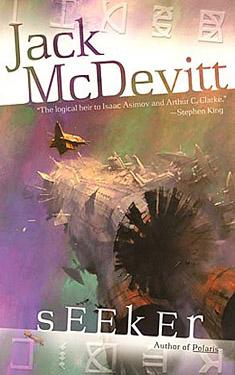James McDevitt
Completed 1/25/2021, Reviewed 1/25/2021
3 stars
I haven’t read much mystery. I’ve read a few SF/F mysteries and a few have been good, a few not so good. This one lands somewhere in the middle. It was entertaining and I’m quite impressed that it wasn’t just a mystery in a science fiction setting. The plot was about the fate of missing colony ships from the Earth’s distant past, the 27th century. There were some standard mystery tropes, like the bad people who are trying to prevent the heroes from making their discovery. It was entertaining, but this book won the Nebula in 2006. I would have expected a much higher caliber story and much better writing.
This
is the third book about far-future antiquities dealer Alex Benedict and his
assistant Chase Kolpath. In this book, the
two come upon a cup that appears to be from The Seeker, one of two ships that
left Earth in the 2600’s to flee a repressive theocracy that had gained hold in
the U.S. Alex does his due diligence in
making sure that the property isn’t stolen and finds that it was. The original owners were explorers who may
have come across The Seeker in their travels after retirement. This prompts Alex and Chase to go out on their
own and try to find the ship and, perhaps, the mythical Eden that they went in
search of. But someone doesn’t want them
to reach their destination and will go to any length to stop them.
The
book is narrated by Chase. She has a
pretty good perspective on her job and her boss. Alex may have the insight and the instincts,
but Chase does the legwork. We spend a
lot of time with her interviewing archeologists, astrophysicists, and relations
to figure out the 9000-year-old mystery of The Seeker. Despite this, there isn’t that much character
development of her or Alex. They both
seemed wooden, and many of the supporting characters were pretty standard, dare
even say cardboard.
There’s
a lot of dialogue in the first half of the book. That’s what moves the plot, as more and more
details of The Seeker and its mission are unraveled. And I must say, this part was pretty good. The action in the second half was decent as
well. I’d say, in general, that the
writing was effective enough to keep me pretty engrossed in the story. There just wasn’t anything special about it.
There
are some interesting points made about the difference between archeology and
antiquities dealing. There are people
who accuse the dealers of selling out the past when it should be preserved for
all. Alex seems to be a dealer on the
cusp of his own metanoia about his occupation in this book. It would be interesting to see the
development of his conscience over the course of the eight books in the
series.
There
is also some discussion of xenophobia.
It turns out that after thousands of years of near and faster than light
travel, humans have only encountered one alien race. They are rather gruesome to look at and hard
to understand despite their being psychic communicators. But we are gruesome to them as well. Over the centuries, we have had war and peace
with them. At this point in time, we are
at peace. This has been accomplished by
keeping the races rather separated with preparatory training required to be
able to handle being around them.
This
was not a bad book, but it was hardly worthy of an award given by other
writers. I’d call this book fluff,
something fun to read, not something that has much depth to it. Would I read any of the other books in the
series? Sure, but I have many other
books on my TBR list that I’m much more interested in. I’d recommend this book to someone who is looking
for some light, fun reading, who likes mysteries, and probably would immerse
themselves in the whole series. This
book can be read without reading the first two, with only passing references to
things and situations from the previous books.

this sounds like something i would like to read. Thanks for the review
ReplyDelete